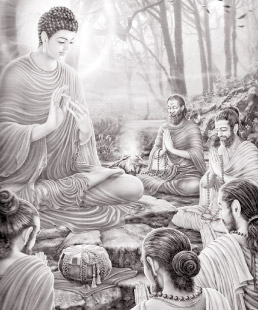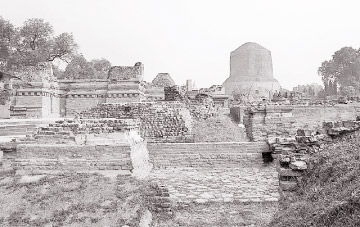The birth of Buddhism
By Kalakeerthi Edwin Ariyadasa
“Oh Supreme! Let thy
Great Law be uttered!” Whereupon the Master cast His vision forth on
flesh, saw who should hear and who must wait to hear. Then spake
divinely smiling, “Yes, I preach. Who so listen let him learn the law!”
Light of Asia – Sir
Edwin Arnold
|

The Buddha's first sermon to the Five Ascetics |
Ascetic Siddhartha attained Supreme Enlightenment 2602 years ago at
Buddha Gaya, under the sheltering Bo tree. In such a sacred context, it
may seem quite intriguing to pose the question, “When was Buddhism
born?”
In terms of popular belief, Buddhism was born at the moment of the
attainment of Supreme Enlightenment by Ascetic Siddhartha.
On further thought, anyone will see clearly that the attainment of
Supreme Enlightenment was a personal spiritual triumph of Ascetic
Siddhartha.
Born as Prince Siddhartha, he spent 29 years of his life in the lap
of ultra-royal luxuries and privileges. But the enigma of human
existence troubled his inner being no end. In his Great Renunciation, he
left for ever, the life of palatial pleasures.
For six long years, he inflicted excruciatingly painful physical
tortures upon himself, seeking realisation through wrenching
austerities. Discarding those as ineffective, he sought the Middle path.
This exceptional human being sat under the Bo tree and grappled with
his mind in an unprecedented spiritual conflict.
The Supreme Truth dawned on him at last, transforming the Ascetic
into the conqueror and the Supremely Enlightened Buddha.
The Supremely Enlightened Buddha spent the first seven weeks of His
Enlightenment in deep contemplation, pondering the unparalleled victory
He had own.
Transcendental wisdom
The Supreme Buddha was hesitant. “Could there be others, who will be
capable of realising the transcendental wisdom I achieved?”. The Maha
Brahma intervened with an entreaty: “Please Supreme, declare your Great
Dhamma Law to the waiting world.”
The Buddha received His first meal after Enlightenment from the two
merchant brothers – Tapassu and Bhalluka.
They took the two refuges Buddha and Dhamma and received a few
strands of the Buddha's Hair Relics, as mementos. The Buddha did not
declare His spiritual system to them, though He esteemed their devotion.
The Buddha thought of those who should receive this Immortal Gift of
Dhamma. He knew that His former Gurus, Alara Kalama and Uddakarama Putta
were no more.
|

The site of the Buddha's first sermon |
Then, He turned His divine eye to His five co-seekers of the truth.
These five-fold ascetics – Kondanna, Bhaddiya, Vappa, Mahanama and
Assaji had left Him, when Ascetic Siddhartha gave up his austerities.
The Buddha knew that these five ascetics were at Isipatana at
Benares, preaching their religious rituals.
The Supremely Enlightened Buddha decided that He should declare to
these five-fold ascetics, the transcendental outcome of His spiritual
quest, since they were co-seekers of the Truth with Him for quite some
time.
When the five ascetics saw the Buddha approaching, they thought that
Ascetic Siddhartha was coming back to them as His quest has failed. They
were all in one mind: “We will not show him any deference. We will treat
him merely as a visitor”. However, when the Buddha came closer, they
were overwhelmed by His serenity of appearance.
A spiritual glow emanated from Him. Their initial resolve was gone.
They hurried about to offer Him high deference and received Him with
great cordiality.
Tranquil atmosphere
In the calm and tranquil atmosphere of Isipatana (the assembly place
of sages), the Supremely Enlightened Buddha made the first official
declaration of His spiritual system. In effect, at this place, Buddhism
was formally born.
The Buddha's initial sermon, the Dhamma Cakkapavattana Sutta (The
discourse on the turning of the Wheel) is the supreme manifesto of the
religious system known as Buddhism.
This is a profound religious charter that receives the concerned
attention, not only of Buddhists, but of all those devoted to a
spiritual way of life.
This discourse sets down the Four Noble Truths that govern the
totality of human existence. Here, the Buddha indicates the five-fold
process of acquiring knowledge, in the following words: Cakkum Udapadi
(The Eye arose), Nanam Udapadi (Recognition arose), Panna Udapadi
(Wisdom arose), Vijja Udapadi (Analysis arose) and Aloko Udapadi (Total
Light arose).
These five steps leading to the process of understanding is quite
close to the scientific thinking, even of the 21st century.
The Buddha declared that this was a system of thought that was
totally unknown previously and that no one can reverse this wheel (the
process).
Spiritual thought
This way, the system of spiritual thought known as Buddhism was
formally born 2,602 years ago at Isipatana in Benares. The declaration
of the Buddha reached the highest areas of the universe, in a series of
relays - according to the text of this Discourse.
A word is due about the venue where this discourse was first
preached. The area is described in the text as Migadaya. The present
English rendering of this word as Deer Park is thought to be a misnomer.
Migadaya implies animal sanctuary, as the ancient word ‘Miga’ meant all
animals.
Besides, it is quite reasonable to assume that if a ruler were to
declare a place to be an animal sanctuary, it is a sanctuary for all
animals and not only for deer.
To mark the exact spot where the discourse was held, Emperor Asoka
set up an edifice. This is not a conventional stupa, but a memorial
structure. It has been described as Damek all along. It is an ancient
version of Dhamsak. We could compare this with the Sinhala version
‘Damsak'.
At this sanctuary, there was a special area set aside for the feeding
of squirrels (this area is known as Kalandakanivasa).
To my mind, some of the animals that roam around Migadaya today could
very well be the descendants of those ancestors, who heard the sonorous
tones of the Supremely Enlightened Buddha, when He presented the Dhamma
Cakkapavattana Sutta originally.
After the discourse, one of the five-fold ascetics, Kondanna,
realised the Truth, becoming the first individual to achieve that
spiritual distinction.
The total outcome of all this is that Buddhism was formally born with
the Buddha's presentation of the Dhamma Cakka Discourse, which is one of
the earliest religious charters of mankind.
|


